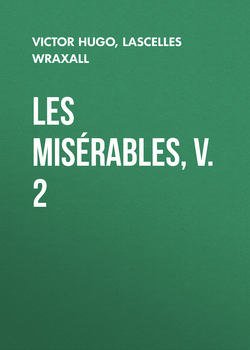Читать книгу Les Misérables, v. 2 - Victor Hugo, Clara Inés Bravo Villarreal - Страница 13
BOOK I
WATERLOO
CHAPTER XIII
THE CATASTROPHE
ОглавлениеThe rout in the rear of the guard was mournful; the army suddenly gave way on all sides simultaneously, – at Hougomont, La Haye Sainte, Papelotte, and Plancenoit. The cry of "Treachery!" was followed by that of "Sauve qui peut!" An army which disbands is like a thaw, – all gives way, cracks, floats, rolls, falls, comes into collision, and dashes forward. Ney borrows a horse, leaps on it, and without hat, stock, or sword, dashes across the Brussels road, stopping at once English and French. He tries to hold back the army, he recalls it, he insults it, he clings wildly to the rout to hold it back. The soldiers fly from him, shouting, "Long live Marshal Ney!" Two regiments of Durutte's move backward and forward in terror, and as it were tossed between the sabres of the Hussars and the musketry fire of Kempt's, Best's, and Pack's brigades. A rout is the highest of all confusions, for friends kill one another in order to escape, and squadrons and battalions dash against and destroy one another. Lobau at one extremity and Reille at the other are carried away by the torrent. In vain does Napoleon build a wall of what is left of the Guard; in vain does he expend his own special squadrons in a final effort. Quiot retires before Vivian, Kellermann before Vandeleur, Lobau before Bülow, Moraud before Pirch, and Domor and Subervie before Prince William of Prussia. Guyot, who led the Emperor's squadrons to the charge, falls beneath the horses of English Dragoons. Napoleon gallops along the line of fugitives, harangues, urges, threatens, and implores them; all the mouths that shouted "Long live the Emperor!" in the morning, remained wide open; they hardly knew him. The Prussian cavalry, who had come up fresh, dash forward, cut down, kill, and exterminate. The artillery horses dash forward with the guns; the train soldiers unharness the horses from the caissons and escape on them; wagons overthrown, and with their four wheels in the air, block up the road and supply opportunities for massacre. Men crush one another and trample over the dead and over the living. A multitude wild with terror fill the roads, the paths, the bridges, the plains, the hills, the valleys, and the woods, which are thronged by this flight of forty thousand men. Cries, desperation; knapsacks and muskets cast into the wheat; passages cut with the edge of the sabres; no comrades, no officers, no generals recognized, – an indescribable terror. Ziethen sabring France at his ease. The lions become kids. Such was this fight.
At Genappe an effort was made to turn and rally; Lobau collected three hundred men; the entrance of the village was barricaded, but at the first round of Prussian canister all began flying again, and Lobau was made prisoner. This volley of shot may still be seen, buried in the gable of an old brick house on the right of the road, just before you reach Genappe. The Prussians dashed into Genappe, doubtless furious at being such small victors, and the pursuit was monstrous, for Blücher commanded extermination. Roguet had given the mournful example of threatening with death any French Grenadier who brought in a Prussian prisoner, and Blücher surpassed Roguet Duchesme, general of the young guard, who was pursued into the doorway of an inn in Genappe, surrendered his sword to an Hussar of death, who took the sword and killed the prisoner. The victory was completed by the assassination of the vanquished. Let us punish, as we are writing history, – old Blücher dishonored himself. This ferocity set the seal on the disaster; the desperate rout passed through Genappe, passed through Quatre Bras, passed through Sombreffe, passed through Frasnes, passed through Thuin, passed through Charleroi, and only stopped at the frontier. Alas! and who was it flying in this way? The grand army.
Did this vertigo, this terror, this overthrow of the greatest bravery that ever astonished history, take place without a cause? No. The shadow of a mighty right hand is cast over Waterloo; it is the day of destiny, and the force which is above man produced that day. Hence the terror, hence all those great souls laying down their swords. Those who had conquered Europe, fell crushed, having nothing more to say or do, and feeling a terrible presence in the shadow. Hoc erat in fatis. On that day the perspective of the human race was changed, and Waterloo is the hinge of the 19th century. The disappearance of the great man was necessary for the advent of the great age, and He who cannot be answered undertook the task. The panic of the heroes admits of explanation: in the battle of Waterloo there is more than a storm, – there is a meteor.
At nightfall, Bernard and Bertrand seized by the skirt of his coat, in a field near Genappe, a haggard, thoughtful, gloomy man, who, carried so far by the current of the rout, had just dismounted, passed the bridle over his arm, and was now, with wandering eye, returning alone to Waterloo. It was Napoleon, the immense somnambulist of the shattered dream, still striving to advance.
